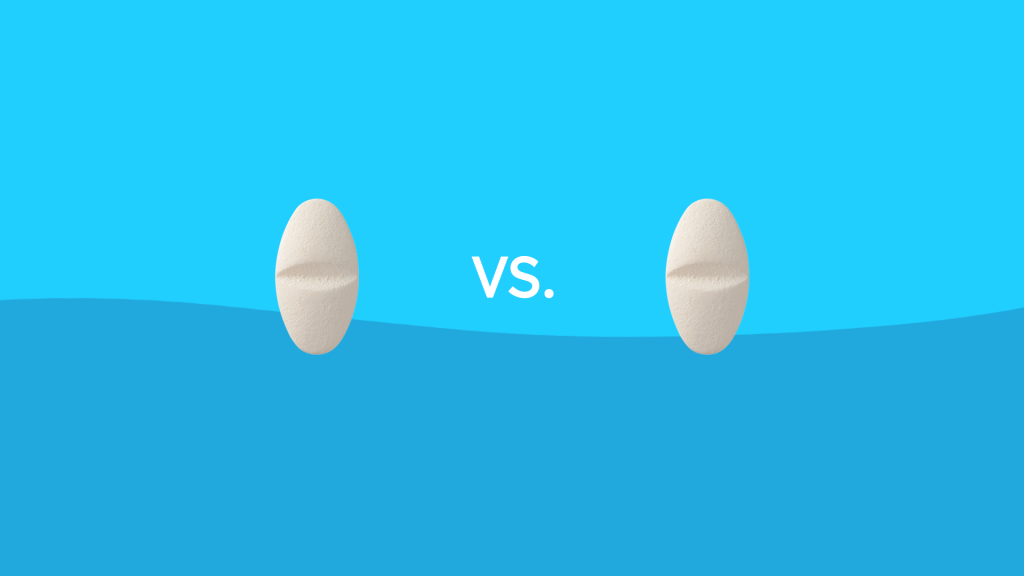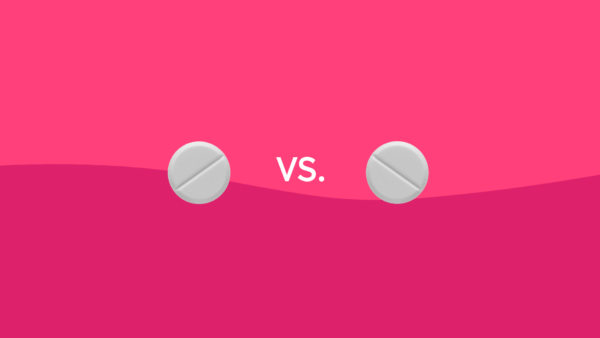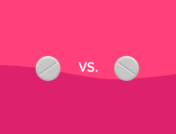Drug overview & main differences | Conditions treated | Efficacy | Insurance coverage and cost comparison | Side effects | Drug interactions | Warnings | FAQ
Abilify and Seroquel are two prescription drugs classified as atypical antipsychotics. Atypical antipsychotics are used in the treatment of mental health disorders such as major depression, bipolar disorder, and schizophrenia, among others. These disorders affect many people and greatly impact overall health and quality of life. Almost 20 million Americans, or 8% of the U.S. population, have had at least one major depressive episode. Bipolar disorder will affect over 4% of the population at some point in their lifetime. Schizophrenia is one of the leading causes of disability worldwide.
The approach to treating these disorders is unique to each patient. It often takes more than one treatment type to achieve relief or remission of symptoms. Other treatment types may include selective serotonin reuptake inhibitors (SSRIs), typical antipsychotics (first-generation antipsychotics), and group or individual therapy.
What are the main differences between Abilify vs. Seroquel
Abilify (aripiprazole) is a prescription medication belonging to a class of drugs known as atypical antipsychotics. Abilify is used in the treatment of mental health disorders such as depression, bipolar disorder, and schizophrenia, among others. Abilify has both partial agonist and antagonist activity at serotonin and dopamine receptors. Serotonin and dopamine are neurotransmitters known to play a role in many roles such as mood, disposition, agitation, sleep, movement, and digestion. Through its role at these receptors, Abilify is able to decrease the severity of symptoms related to depression and other mental health disorders. Abilify is available in multiple doses as an oral tablet and solution, an oral disintegrating tablet, an injection, and the newest formulation, Abilify MyCite. Abilify MyCite is an oral tablet with a built-in sensor to help monitor if and when you take your medication, your mood, and other factors through an app.
Seroquel (quetiapine) is also a prescription medication belonging to the class of drugs known as atypical antipsychotics. Seroquel only has antagonist effects on the serotonin and dopamine pathways. It is also used for major depression, bipolar disorder, and schizophrenia, like Abilify. Seroquel is available in a variety of dosages in both immediate-release and extended-release oral tablets.
Main differences between Abilify and Seroquel |
||
|---|---|---|
| Abilify | Seroquel | |
| Drug class | Atypical antipsychotics | Atypical antipsychotics |
| Brand/generic status | Brand and generic available | Brand and generic available |
| What is the generic name? | Aripiprazole | Quetiapine |
| What form(s) does the drug come in? | Oral tablet, oral solution, oral disintegrating tablet, injection, and oral tablet with sensor | Immediate-release and extended-release oral tablets |
| What is the standard dosage? | 10 mg to 15 mg once daily | 150 mg tablet once daily |
| How long is the typical treatment? | Long-term | Long-term |
| Who typically uses the medication? | Children, adolescents, and adults | Children, adolescents, and adults |
Conditions treated by Abilify and Seroquel
Abilify and Seroquel are antipsychotic medications that share three common indications approved by the Food and Drug Administration (FDA): major depressive disorder, bipolar disorder, and schizophrenia Abilify also carried a unique indication for use in its ability to treat irritability associated with autistic disorder. While Seroquel is approved as a singular treatment for depression, Abilify’s approval is only as an adjunct treatment in patients where other traditional antidepressants aren’t adequate.
Both drugs are also used off-label, or without FDA approval, for other mental health disorders. Both have been used in treating psychosis associated with dementia. Remember, only your doctor can decide if one of these drugs is appropriate for you and your diagnosis.
| Condition | Abilify | Seroquel |
| Major depressive disorder | Yes | Yes |
| Bipolar disorder | Yes | Yes |
| Schizophrenia | Yes | Yes |
| Irritability associated with Autism | Yes | No |
| Tourette’s syndrome | Off-label | No |
| Psychological symptoms of dementia | Off-label | Off-label |
| Obsessive-compulsive disorder (OCD) | No | Off-label |
| Borderline personality disorder | No | Off-label |
Is Abilify or Seroquel more effective?
In a meta-analysis comparing 15 antipsychotic medications from multiple classes in the treatment of schizophrenia, each drug was compared to placebo for efficacy. While both drugs were significantly better than placebo and considered effective in the treatment of schizophrenia, Seroquel was found to show more improvement in symptoms as compared to placebo. Seroquel was also shown to cause more weight gain as compared to the other drugs. A randomized, double-blind clinical trial compared Seroquel and Abilify head to head and found them both to be effective in treating schizophrenia, with one not being significantly better than the other.
When comparing Abilify, Seroquel, and 2 other antipsychotics (risperidone and olanzapine) as adjunct treatments for depression, results from one analysis showed that adjunct treatment with either of these drugs lead to better treatment response and increased remission rates as well as less frequent psychiatric hospital stays.
This is not intended to be medical advice. Ultimately, only your psychiatric health care provider can determine which treatment approach is right for your disorder.
Coverage and cost comparison of Abilify vs. Seroquel
Abilify is a prescription drug that is covered by most commercial and Medicare insurance drug plans. The out-of-pocket price for Abilify can be as much as $1070 for a one-month supply. Luckily, SingleCare offers a savings coupon for Abilify and its generic, aripiprazole. You can get a 30 day supply of the generic for less than $10.
Seroquel is also a prescription drug that is covered by almost all commercial and Medicare insurance plans. The cost without insurance for a one-month of supply for Seroquel is over $250. With a SingleCare coupon, generic Seroquel is less than $5 at participating pharmacies.
| Seroquel | Abilify | |
| Typically covered by insurance? | Yes | Yes |
| Typically covered by Medicare Part D? | Yes | Yes |
| Quantity | 30, 100 mg tablets | 30, 5 mg tablets |
| Typical Medicare copay | < $10 | < $10 |
| SingleCare cost | $10-$230 | $5-$65 |
Common side effects of Abilify vs. Seroquel
Abilify and Seroquel share many common potential adverse events, though the rate at which they typically occur can be very different for each drug. Adverse events with antipsychotic drugs can for some be so bothersome that they elect to discontinue therapy. It is important to have open conversations about your mental illness symptoms and the effects of your medications with your healthcare professional so that the best course of action can be determined.
Fatigue and sedation are two of the most common adverse effects of second-generation antipsychotics like Abilify and Seroquel. This is due to their affinity for histamine receptors. While sedation is a pronounced side effect for these drugs, second-generation antipsychotics are considered to be less sedating on average than first-generation, or typical, anti-psychotics. When prescribing antipsychotic medications, it is important to place value on the tolerability of the drug in order to achieve compliance.
| Abilify | Seroquel | |||
| Side Effect | Applicable? | Frequency | Applicable? | Frequency |
| Blurred vision | Yes | 6 | Yes | 4 |
| Dry mouth | No | n/a | Yes | 44 |
| Constipation | Yes | 5 | Yes | 10 |
| Fatigue | Yes | 8 | Yes | 10 |
| Jitters | Yes | 3 | Yes | 2 |
| Upper respiratory infection | Yes | 6 | No | n/a |
| Weight gain | Yes | 3 | Yes | 4 |
| Increased appetite | Yes | 3 | Yes | 5 |
| Arthralgia | Yes | 4 | Yes | 3 |
| Myalgia | Yes | 3 | No | n/a |
| Akathisia | Yes | 25 | Yes | 4 |
| Somnolence | Yes | 6 | Yes | 57 |
| Tremor | Yes | 5 | Yes | 2 |
| Attention disturbance | Yes | 3 | No | n/a |
| Extrapyramidal symptoms (EPS) | Yes | 2 | Yes | 3 |
| Restlessness | Yes | 12 | No | n/a |
| Insomnia | Yes | 8 | No | n/a |
Source: DailyMed (Abilify) Dailymed (Seroquel)
Drug interactions of Abilify vs. Seroquel
Abilify and Seroquel are substrates of the enzyme CYP3A4, meaning their metabolism is dependent upon this enzyme. Other drugs which either induce or inhibit this enzyme will affect the metabolism and effects of both drugs.
The common antifungals itraconazole and ketoconazole are inhibitors of CYP3A4, and therefore the metabolism of Abilify and Seroquel is slowed down and blood levels are increased. Long term use of drugs that inhibit CYP3A4 may require a dose decrease adjustment to avoid toxicity. On the contrary, drugs which induce CYP3A4, such as carbamazepine, speed up the metabolism of Abilify and Seroquel, potentially causing subtherapeutic levels of the drug in your system.
Abilify is also partially metabolized by a second enzyme, CYP2D6. Quinidine, a drug given to treat or prevent malaria, has such an effect on Abilify levels that the Abilify dose needs to be reduced to half when a patient is also taking quinidine.
The following table is not intended to be an all-inclusive list of potential drug interactions. Please check with your pharmacist for a complete list.
| Drug | Drug Class | Abilify | Seroquel |
| Hydrocodone Oxycodone Dihydrocodeine |
Opioid agonists | Yes | Yes |
| Alfuzosin | Alpha-1 receptor antagonist | Yes | Yes |
| Alogliptin | Dipeptidyl peptidase-4 (DPP-4) inhibitors | Yes | Yes |
| Amiodarone | Class III antiarrhythmic | Yes | Yes |
| Amitriptyline | Tricyclic antidepressants | Yes | No |
| Celecoxib | COX-2 Nonsteroidal anti-inflammatory drugs | Yes | No |
| Azithromycin
Clarithromycin |
Macrolide antibiotics | Yes | Yes |
| Brexpiprazole | Atypical antipsychotic | Yes | No |
| Buprenorphine | Mixed opiate agonist-antagonist | Yes | Yes |
| Itraconazole Ketoconazole |
Antifungals | Yes | Yes |
| Carbamazepine | Antiepileptic | Yes | Yes |
| Quinidine | Antimalarial drug | Yes | Yes |
| Phenytoin | Antiepileptic | No | Yes |
Warnings of Abilify and Seroquel
Do not take Abilify or Seroquel if you have ever had any type of sensitivity or allergic reaction to either drug.
Both adults and children may experience an increase in depression and suicidal thoughts while on antidepressants and antipsychotic drugs. Children and young adults seem to experience a more significant increase in depression and suicidal thoughts. This risk exists until medications have these disorders in remission. These groups should be monitored closely while on these types of medications.
Caution should be used in elderly patients, especially those with dementia-related psychosis or Alzheimer’s disease. An increased risk of cerebrovascular events such as stroke are a concern in these patients.
Neuroleptic Malignant Syndrome (NMS) is a risk of antipsychotic treatment. Symptoms include rigid muscles, altered mental status, and irregular pulse or blood pressure. While rare, it can be fatal, and patients should be monitored for signs and symptoms.
While alcohol does not have directly interact with Abilify or Seroquel, it is recommended that patients taking Abilify or Seroquel limit or avoid alcohol intake due to its ability to cause an altered mental state and physical impairment.
Atypical antipsychotics have been linked to metabolic changes in patients such as diabetes mellitus, obesity, and dyslipidemia (high cholesterol). In some cases, these conditions are corrected by stopping the drug, but they could be long-lasting. A systematic review looked at the metabolic changes caused by second-generation antipsychotics. While Abilify and Seroquel did both cause changes in cholesterol, specifically triglycerides, these changes were not as pronounced as with other drugs such as olanzapine. Parameters and positive symptoms related to these disorders should be monitored closely.
Frequently asked questions about Abilify vs. Seroquel
What is Abilify?
Abilify is an atypical antipsychotic prescription medication. It has effects on both serotonin and dopamine neurotransmitter pathways. It is available in multiple strengths as an oral tablet and solution, an orally disintegrating tablet (ODT), and a new tablet with an internal sensor.
What is Seroquel?
Seroquel is also an atypical antipsychotic prescription medication. It has effects on both serotonin and dopamine neurotransmitter pathways. It is available as oral immediate-release and extended-release tablets in various strengths.
Are Abilify and Seroquel the same?
Abilify and Seroquel are both atypical antipsychotics, but they are not the same. While they both block dopamine and serotonin action, Abilify is also a selective stimulator at these receptors. They have similar indications for use, but may also be used for unique indications as well.
Is Abilify or Seroquel better?
Abilify and Seroquel have both been proven to be very effective drugs. The results of one study indicated that Seroquel may have shown better improvement in symptoms, but also caused more metabolic changes and weight gain. Your physician will help you weigh which option is best for you.
Can I use Abilify or Seroquel while pregnant?
There are not enough studies to establish the safety of either drug in pregnant patients. However, fetal toxicity has been observed in animal studies, and therefore these drugs should only be used when the benefit absolutely outweighs the risk. Breast-feeding should not occur while patients are on these drugs.
Can I use Abilify or Seroquel with alcohol?
While alcohol does not directly interact with either drug, it is recommended that patients limit or avoid alcohol intake due to its ability to cause an altered mental state.
What is a good replacement for Seroquel?
Other atypical antipsychotics may be tried when Seroquel is not effective or has intolerable side effects. Those may include Risperdal, Rexulti, Zyprexa, or Latuda.
Does Abilify help with anxiety?
Abilify is not indicated in the treatment of anxiety. While many patients living with schizophrenia or bipolar disorder may experience anxiety, they may require additional treatment to control their anxiety.
Does Abilify help you sleep?
While not approved to treat insomnia, Abilify does cause a significant amount of drowsiness and somnolence. Patients may find that it helps with their sleep patterns when taken at night.





